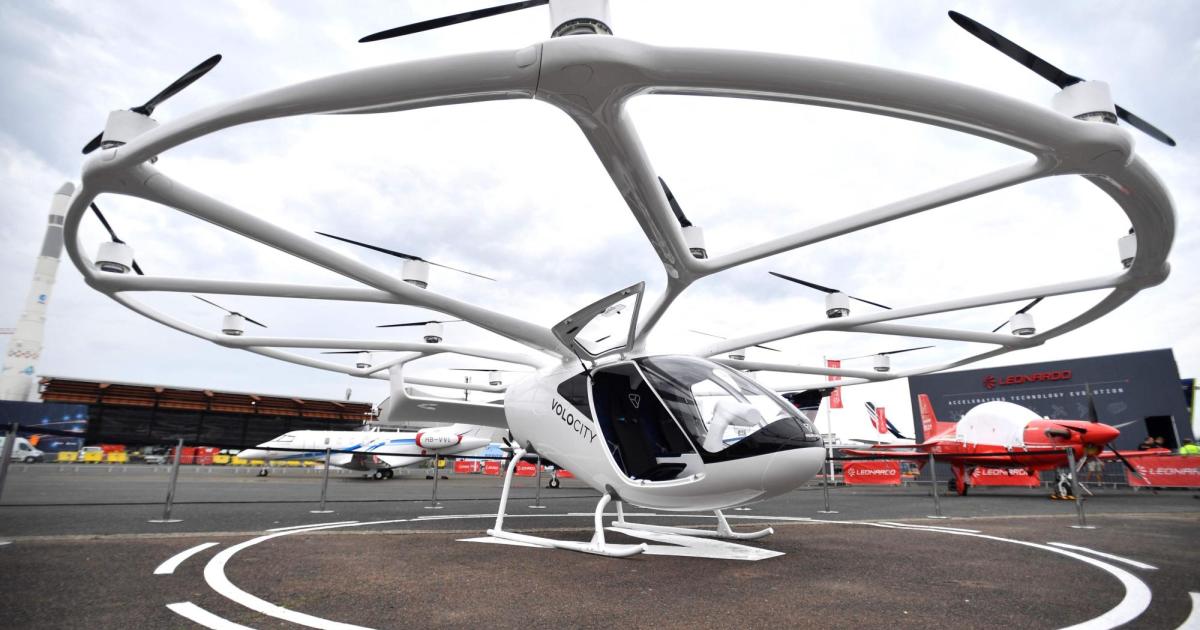The ailing German air taxi manufacturer Volocopter has filed for bankruptcy and is looking for investors. The Karlsruhe District Court has Tobias Choice von Anchor Lawyers The company from Bruchsal, Baden, announced on Monday that it had been appointed as provisional insolvency administrator.
The lawyer announced that he would develop a restructuring concept and implement it with investors by the end of February. “The company now needs financing that will enable it to take the final steps to enter the market.”
Volocopter still lacks a type certificate European Aviation Safety Agency (EASA), in order to be able to transport passengers with the vertical take-off, fully electric aircraft. Despite the insolvency proceedings being filed on Boxing Day, the company assumes that this will come in the new year and then things can get started.
“We are at the forefront of national and international competition both technologically and in terms of flight experience as well as in the certification process,” said the Volocopter boss Dirk Hokewho is leaving the company at the end of February.
No information was given about the amount of the liabilities, but they are likely to be in the millions.
Parallels to Lilium
“Business operations continue,” said a spokeswoman. “The aim is to preserve jobs and use the insolvency proceedings to restructure Volocopter and make it sustainably competitive.” Under Hoke, the number of employees has been reduced from around 700 to currently 500.
It was only in mid-November that Volocopter appointed Oliver Vogelgesang as CFO. He came from the also insolvent electric aircraft pioneer Lilium from Bavaria. The start-up company only announced at Christmas that the investor consortium Mobile Uplift Corporation was taking over the operation. According to a spokesman, 750 employees who were laid off a few days before Christmas should be brought back. Unlike Volocopter, the insolvency proceedings there are under self-administration.
No help from the state
The CSU politician Dorothee Bär brought the air taxi industry into the public eye with an interview a few years ago. But the industry in Germany didn’t really get off the ground. Lilium and Volocopter had repeatedly sought financial support in the past.
State aid from Baden-Württemberg and Bavaria, which had been discussed over the course of the year including the move of Volocopter’s headquarters to the Free State, failed to materialize. Most recently it was about 50 million euros each from the federal government and Bavaria. In the end, the money came from investors.
The financial service Bloomberg later reported that the Chinese conglomerate Geely was interested in taking over the air taxi start-up Volocopter. Volocopter did not want to comment on the content at the time.
Search for a successor for a managerial position
Now the statement says that numerous rounds of financing have advanced development and operations in the past. Until recently, Volocopter existed in an extremely difficult financial environment. “Despite intensive efforts, it was not possible to find a viable solution to maintain regular operations outside of Volocopter GmbH’s insolvency proceedings.”
Hoke had criticized politicians after the lack of aid and accused them of a lack of support: “Of course, in an industry as technologically complex and capital-intensive as ours, you also look towards the state,” he told the magazine “Capital”.
However, the fact that the CEO is leaving in the spring has nothing to do with the bankruptcy and has been known for a long time. Former Daimler boss Dieter Zetsche is said to be looking for a successor as chairman of the advisory board.
In Germany only rescue missions?
Volocopter actually wanted to fly people during the Olympic Games in Paris. Even if the company does not yet have permission to operate commercial passengers, the air taxis can still be seen. There were show flights in Paris, including near the Palace of Versailles, and regular test flights. Volocopter is also allowed to train pilots.
The start-up has cities like Rome and Osaka on its agenda. However, regular flights in Germany are not a priority because, according to information, the cities in this country are not that large and densely populated. They also have self-sufficient local transport networks. In Germany, Volocopter is working with the ADAC air rescue service to test its use for rescue purposes.
Although advertised as sustainable and quiet, modern aircraft are not without controversy: an analysis of eleven studies by the Leibniz Center for European Economic Research (ZEW) in Mannheim showed that travel times were hardly shortened, while costs and compared to electric cars also increased CO2 emissions increased. “Urban air mobility can be particularly useful in emergency operations and for connecting remote regions.”

Member Publicrt Profile
Mark Bulut
Find A Spring – Members
My profile – About me – timurkurt – MyOMSYSTEM
Cemila Kurt – FYERS Community – Pick others' brains on Trading/Investing
Sweet Bonanza: Renkli Eğlence ve Büyük Kazançlarla Şeker Gibi Bir! / Off-Topic Chat / AfterPad Forums
Seven Kurt | Western City Magazine
Underwater Photographer Markus Kurt
Buy Beats Online | Download Beats | Rap Beats For Sale | Instrumentals For Sale
Pastelink.net – Publish Hyperlinks
Just a moment…
Irmak Kurt (Hufflepuff) | Hogwarts is Here
My profile – About me – omarsari – MyOMSYSTEM
ShippingExplorer – markusfill
Find A Spring – Members
Deniz Bulut | Western City Magazine
Plinko Casino: Eğlenceli Oyunlar ve Kolay Kazançlarla Harika Bir! / Off-Topic Chat / AfterPad Forums
Berna Sari – FYERS Community – Pick others' brains on Trading/Investing
Elif Sari
Pastelink.net – Publish Hyperlinks
Buy Beats Online | Download Beats | Rap Beats For Sale | Instrumentals For Sale
Melek Bulut (Ravenclaw) | Hogwarts is Here
Just a moment…
Find A Spring – Members
ShippingExplorer – alisari
Omer Bulut
Just a moment…
Yeter Sari (Gryffindor) | Hogwarts is Here
Lora Kurt – TamilCulture
Forum | Internal Medicine Board Review Questions | Knowmedge